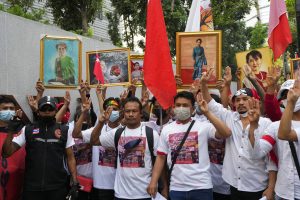On the eve of the second anniversary of the brutal military coup in Myanmar, the United States seems to be joining the list of countries complicit in the regime’s atrocities, along with the likes of Russia and China.
Despite the Biden Administration’s copious number of statements expressing “deep concern” about the situation in the country, the Myanmar junta’s defense ministry has been invited to “a regional military meeting and table-top exercise” co-hosted by the U.S. and Thailand next month. Lt.-Col. Martin Meiners, a spokesperson for the U.S. Department of Defense (DoD), confirmed this information to a local media outlet Myanmar Now.
Given that this is a high-level invitation intended for regional security partners, the U.S. is not only providing a veil of legitimacy to the Myanmar military and its brutal actions but also oiling the gears of the military’s killing machine. Since the coup, the regime has arrested over 17,000 and killed nearly 2,900 of its own citizens, including children. A staggering 1.6 million people are currently displaced while the soldiers continue to rage a terror campaign across the country – burning villages, forcibly disappearing opposition party members, and committing gruesome massacres with impunity. “Table-top exercises” are the last thing these killers need.
What is more outrageous is that this is not a standalone oversight by the U.S. government. When news of this invitation broke, Burmese advocates such as myself were still in shock at Human Rights Watch (HRW)’s revelation that from July to November 2022, the U.S. Treasury Department cleared a $1.3 million payment from Japanese firm Yokogawa Bridge Corp. to Myanmar Economic Corporation (MEC), a U.S. sanctioned military conglomerate led by coup leader Min Aung Hlaing himself.
It was not the only payment made, either. HRW later found that Yokogawa Bridge Corp. also made similar payments to MEC in December 2022 and January 2023, totaling around $2 million. This money will ultimately help fund the regime’s atrocities and likely even be used to acquire weapons from the junta’s top arms suppliers, Russia and China. Treasury’s exemption was a slap on the face of the people of Myanmar who have since the February 2021 coup called for a total disengagement with the junta, and for stronger sanctions and additional actions to cut off its revenue flows.
The U.S.’s position as an ally for democracy in Myanmar looked a lot more promising at the onset of the coup than it does now. Within days of the coup, the Biden administration took swift actions to order punitive measures against the military, including sanctions, freezing of assets, and providing temporary protected status for Myanmar nationals in the U.S.
Yet, the momentum was short-lived. Two years later, the Biden administration still has not developed a clear, effective sanctions strategy. It has also yet to designate the state-owned Myanmar Oil and Gas Enterprise (MOGE), the regime’s single largest source of foreign currency revenue. When we raise the possibility of MOGE sanctions to State Department officials, ironically, we are told that the U.S. is worried about the potential harm caused by sanctions to the Myanmar people. Truly, what more harm could be done than by lining the generals’ pockets?
When the U.S. Congress passed the BURMA Act as an amendment to the 2023 NDAA in December, Burmese advocates in the U.S., including myself, saw it as a glimmer of hope that the U.S. might finally step up its pressure on the Myanmar junta. Many of us have been pushing for the draft legislation of the BURMA Act for the past year-and-a-half but to no avail, due to some roadblocks from Republican senators. So, when it was finally passed, we celebrated it as a major step the U.S. Congress took toward holding the Myanmar military accountable.
Though significantly compressed from an earlier version of the bill, the BURMA Act outlines `concrete policies that can help the pro-democracy movement. The legislation contains provisions to codify and extend targeted sanctions against the junta and its affiliates, pave the way for potential sanctions of MOGE, pledge assistance to pro-democracy groups, including technical support and non-lethal aid to resistance groups, and provide humanitarian assistance.
Unfortunately, recent actions from the Treasury and DoD show a brazen disregard for the priorities set forth by Congress through the BURMA Act to isolate the junta. Instead of implementing the legislation and imposing new sanctions, the Biden administration is falling short of upholding even the existing ones. The recent waiver given to Yokogawa Bridge Corp. raises questions about how many more exemptions have been granted behind closed doors, which have enabled the junta to commit more atrocities.
As for the regional security meeting, the U.S. is using the old playbook of blaming the ASEAN Secretariat for the invite with an air of nonchalance. Hiding behind ASEAN to avoid taking any strong measures has been a hallmark of the U.S.-Myanmar policy since the coup. Instead, the U.S. should be demanding the junta be banned and withdrawing from the meeting otherwise. The idea that the DoD will be giving more training to these war criminals is appalling even as a thought.
Two years on from the coup, the rest of the world had moved on from the crisis in Myanmar. The global response has been largely absent. We need the United States to be championing its democratic allies in imposing costs to the junta, not giving them more support alongside China and Russia.

































